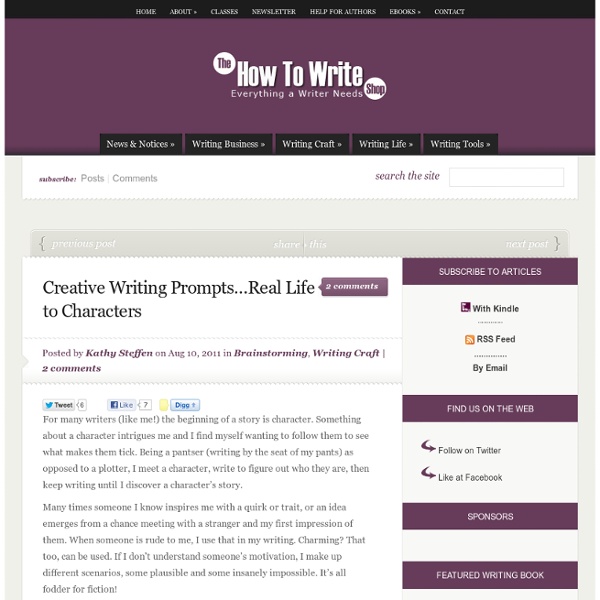Creative Writing Prompts…Real Life to Characters

Types of Characters -- Types of Characters in Fiction
Round character, flat character, stock character, protagonist . . . the types of characters in fiction goes on and on. What do you need to know about each one as you study literature or learn to write it? Find out with the list below. Ready to get started working on characterization, creating your own round characters? These questions can help. Flat Characters Flat characters are minor characters in a work of fiction who do not undergo substantial change or growth in the course of a story. Static Characters When people say that a character is "static," they're referring to the fact that a character doesn't change. Round Characters As a writer, your focus will be on developing your round characters. Dynamic Characters The opposite of static characters, dynamic characters will undergo some kind of change in the course of the story. Stock Characters Many people think the term "stock characters" is just another way to describe static characters, but not so. Protagonists Antagonists
Seven Common Character Types
Seven Common Character Types by Terry W. Ervin II Fiction writers employ a variety of characters while weaving their tales. Beyond the standard definitions of protagonist (the main character in a literary work) and antagonist (the main character or force that opposes the protagonist in a literary work), recognizing the types of characters and the parts they play while reading an interesting story can add to the experience. Confidante- someone in whom the central character confides, thus revealing the main character’s personality, thoughts, and intentions. Example: In a story, Melvin Sanders is a detective on the trail of a serial killer. In this example Chops is a confidante. Dynamic Character - a character which changes during the course of a story or novel. Example: Ebenezer Scrooge, in A Christmas Carol by Dickens, was very stingy with his money. In this example Ebenezer Scrooge is a dynamic character. In this example Louis Drud is a flat character. In this example Betty is a foil.
Character Chart for Fiction Writers - EpiGuide.com
If you're a fiction writer -- whether you're working on a novel, short story, screenplay, television series, play, web series, webserial, or blog-based fiction -- your characters should come alive for your reader or audience. The highly detailed chart below will help writers develop fictional characters who are believable, captivating, and unique. Print this page to complete the form for each main character you create. IMPORTANT: Note that all fields are optional and should be used simply as a guide; character charts should inspire you to think about your character in new ways, rather than constrain your writing. If this character chart is helpful, please let us know! Looking for more character questionnaires / charts?
Related:
Related:



